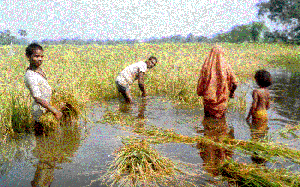
A gene that enables rice to survive complete submergence has been identified by a team of researchers at the International Rice Research Institute in the Philippines and at the University of California’s Davis and Riverside campuses. The discovery allows for development of new rice varieties that can withstand flooding, thus overcoming one of agriculture’s oldest challenges and offering relief to millions of poor rice farmers around the world.
While rice thrives in standing water, like all crops it will die if completely submerged for more than a few days. The development and cultivation of the new varieties is expected to increase food security for 70 million of the world’s poorest people, and may reduce yield losses from weeds in areas like the United States where rice is seeded in flooded fields.
Does anyone still need to be convinced that projects like this make us more friends than enemies around the world?
Using genetic mapping techniques, the research team identified a cluster of three genes that appeared closely linked to the biological processes that either make rice plants vulnerable to flooding or enable them to withstand the total submergence that occurs during flooding.
Going one step further, the researchers introduced the Sub1A gene into a rice variety that is especially suited for growing conditions in India. The resulting rice plants were not only tolerant of being submerged in water but also produced high yields and retained other beneficial crop qualities. Development of submergence-tolerant varieties for commercial production in Laos, Bangladesh and India is now well under way.
I don’t know who drives me crazier: political hacks whose heads are stuck in the Cold War and assign greater priority to military scenarios in developing nations — or 21st Century Luddites who are convinced that genetic manipulation is a tool of Satan!















Although it MIGHT help the poorest farmers in the world, I wonder how much these new strains of rice actually cost. Probably a lot more than regular rice, so how is this helping the ‘poorest farmers in the world’?
Plus, I hear it turns you into fish people.
Nutrinal(sp) value compred to REAL rice…
How about Drought tolerant
I think the word you’re looking for is nutritional… which is a good question..
my next question, can farmers replant their harvest for next year, or do they have to buy more seed each year?
#4 they need to buy more seed next year. The gene for underwater survival is closely linked to the gene for self destruction at the end of the season. (no perenials here). … if it was not linked we can make it linked.
Conspiracy Theory # 125AF6
A few out-of-date questions, guys.
1. Cost is unlikely to be artifically high because unlike the GM crops that seem to make the news, this is developed by governmental bodies in the US and Phillipines — who will be working with their counterparts in the Indian subcontinent.
3. I haven’t wandered into a thorough study of the reports; but, since the sciencedaily report offered nothing contrary, why presume reduced nutrition as a result of resistance to submergence?
4. See 1. GM crops developed by some corporate researchers used to pull that stunt. Some of those are beginning to back away from it for several reasons: farmers always figure out how to bootleg seed. They’re involved in RIAA-style suits all the time, now. Competing firms — as the marketplace broadened out — are willing to cut prices and withdraw sinecures.
People like Monsanto originally thought no one else could do this stuff. They were wrong. It was mostly the early adopters who were screwed.
Not a gardener, eh — Kevin.
While the wild precursor to most strains of Asian rice was perennial, millenia ago — virtually all common strains in agricultural production are annuals.
None of these are useless questions, guys. There’s no shortage of collective bodies, nowadays, that will ask the same questions and pursue the pols, if needed. It’s just there is a significant difference in most of the world as whether or not something agricultural is funded by taxpayer dollars or corporate labs.
At least, until someone needs to hire a lobbyist.
I wonder if there are going to be some corporate lawyers forcing the locals to discard native plants that carry the genes because it infringes the gene patents of the new and improved version?